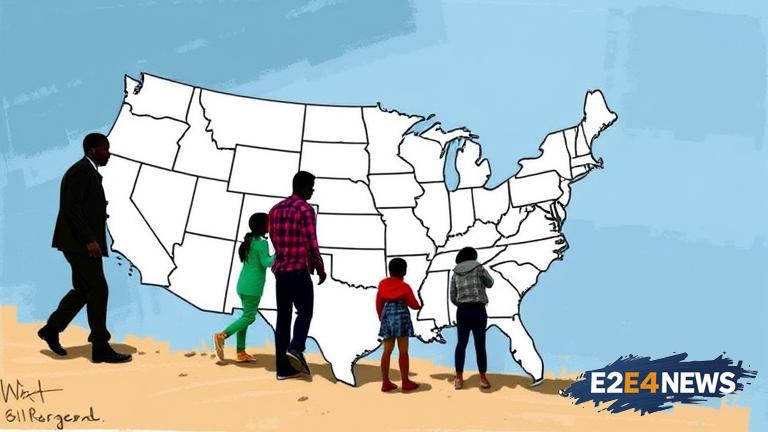The United States has witnessed a notable rise in the number of its citizens seeking refugee status in other countries, according to recent reports. This trend has sparked intense debate and raised concerns about the state of human rights, political stability, and social welfare in the US. The reasons behind this surge are complex and multifaceted, ranging from political persecution and violence to economic instability and climate change. Many Americans are seeking refuge in countries such as Canada, Germany, and Australia, citing a lack of confidence in the US government’s ability to protect their rights and ensure their safety. The refugee status application process is rigorous and often lengthy, involving extensive background checks and interviews. Despite the challenges, an increasing number of Americans are willing to take the risk and start anew in a foreign country. This phenomenon has significant implications for US foreign policy and diplomacy, as well as its reputation as a global leader in human rights and democracy. The US government has been criticized for its handling of various social and political issues, including racial tensions, gun violence, and economic inequality. As a result, many Americans are losing faith in the system and seeking alternative solutions. The refugee crisis is not only a humanitarian issue but also a political and economic one, requiring a comprehensive and coordinated response from governments, international organizations, and civil society. The US must take a hard look at its internal policies and practices to address the root causes of this trend and prevent further brain drain and loss of talent. Moreover, the international community must work together to develop a more effective and sustainable framework for refugee protection and resettlement. The current system is often overwhelmed and underfunded, leading to lengthy delays and uncertain outcomes for asylum seekers. In addition, the rise of nationalist and populist movements in the US and other countries has created a toxic environment for refugees and immigrants, exacerbating the challenges they face. The media has a critical role to play in raising awareness about the refugee crisis and promoting a more nuanced and informed public discourse. By sharing the stories and experiences of refugee applicants, journalists can help humanize the issue and build empathy and understanding. Furthermore, the private sector and civil society organizations can contribute to the solution by providing support services, advocacy, and community engagement. The US government must also engage in a constructive dialogue with its international partners to develop a more coordinated and effective approach to refugee protection and resettlement. This includes sharing best practices, providing technical assistance, and increasing funding for refugee programs. Ultimately, the surge in refugee status applications by Americans is a wake-up call for the US government and the international community to re-examine their priorities and policies. By working together, we can create a more just, equitable, and peaceful world, where everyone has the opportunity to thrive and reach their full potential. The US has a long history of welcoming refugees and immigrants, and it is time to reaffirm this commitment and live up to its ideals as a beacon of hope and freedom. The world is watching, and the US must rise to the challenge and lead by example. The refugee crisis is a complex and multifaceted issue, requiring a comprehensive and sustained response. The US government, international organizations, and civil society must work together to develop a more effective and sustainable framework for refugee protection and resettlement. This includes addressing the root causes of displacement, providing support services and advocacy, and promoting a more nuanced and informed public discourse.
